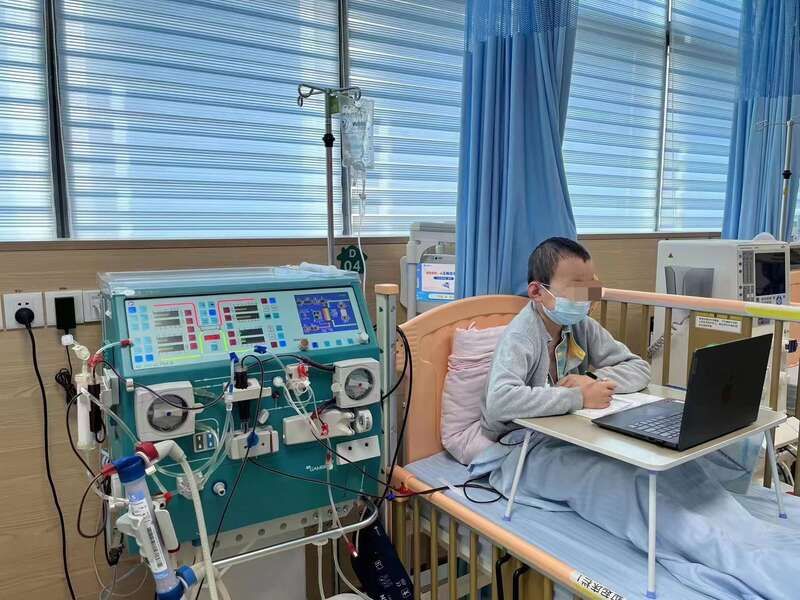China Youth Daily Client News (China Youth Daily, China Youth Daily reporter Wang Yejie) Since the outbreak of the epidemic in Shanghai in March, the situation of hemodialysis patients has always attracted attention from all walks of life. The news hotline opened by the China Youth Daily receives numerous requests for help from hemodialysis patients who have nowhere to go. A few days ago, the reporter learned from the Children’s Hospital Affiliated to Fudan University that since the hospital was closed in mid-to-late March, it has been building a “life channel” for children on hemodialysis.
In mid to late March, according to the requirements of epidemic prevention and control, the inpatient building of the Pediatric Hospital Affiliated to Fudan University was temporarily closed. The blood purification center that receives children with chronic hemodialysis every day is located in the inpatient building. These children live in Minhang, Jing’an, Jinshan, Putuo, Pudong and other areas. What should they do? If dialysis is not performed on time, they can be life-threatening at any time due to fluid overload, hyperkalemia, and toxin accumulation.
“Hemodialysis is their lifeline and cannot be interrupted.” Xu Hong, Secretary of the Party Committee of Fudan Pediatric Hospital, has been concerned about the safety of children on hemodialysis since the beginning of the epidemic. She specifically asked Shen Qian, director of the Department of Nephrology. : “We are the designated dialysis center for these children, and it is our responsibility to arrange where they will continue their treatment.”

Rui Rui (pseudonym), a 14-year-old boy with uremia, was the first to come to the hospital for help. At that time, the blood purification center of Fudan Pediatrics was closed, and Ruirui had nowhere to go for dialysis. Shen Qian contacted several hospitals for her, and finally Shanghai Children’s Hospital expressed its willingness to accept her for hemodialysis. But just when he was about to go, the community he lived in was suddenly blocked and could not go on time. The doctor of Fudan Pediatrics urgently contacted Renji Hospital in Pudong, and finally let him receive hemodialysis there.
The reporter learned that before receiving kidney transplantation, home peritoneal dialysis and hemodialysis are the two main methods of renal replacement therapy for children with uremia. About 90% of the children with uremic dialysis who were followed up by the Nephrology Department of Fudan Children’s Hospital were on home-based autonomous peritoneal dialysis.
“One percent of children choose hemodialysis treatment due to disease or social factors. We must ensure that all children on hemodialysis can receive treatment on time.” Shen Qian introduced that after the hospital’s inpatient building was unsealed , and then all the children on hemodialysis were successively admitted to the hospital for management, so that “no one can be missing”.
On March 27, Rui Rui finally arrived at Fudan Pediatrics and was admitted to the hospital before the implementation of Pudong and Puxi in Shanghai.
On April 25, in the Nephrology Blood Purification Center of the Pediatric Hospital of Fudan University, Rui Rui reported her weight to the attending physician Zhang Zhiqing after hemodialysis, “26.6 kg”. At this time, Rui Rui had been living in Fudan Pediatric Hospital for nearly a month. He originally had to go back and forth to the hospital for hemodialysis three or four times a week. Like other children on hemodialysis, he did not miss a dialysis due to the epidemic lockdown.
It is reported that in addition to hemodialysis children, other children with uremia and other chronic kidney diseases have not been forgotten. During the epidemic, the treatment team of the Nephrology Department of the Children’s Hospital Affiliated to Fudan University, according to the different conditions of children with chronic diseases, implemented one person, one policy, and full-time management through various channels.
In the Pediatric Hospital Internet Hospital, in the Pediatric Hospital’s peritoneal dialysis patient WeChat group and kidney transplant patient WeChat group, and on the intelligent consultation platform of the Fudan Pediatric Nephrology Public Account, the management team of children with chronic kidney disease in the hospital will Arrange staff in shifts to provide guidance on questions from parents of children. For children who live in other provinces and cities but need regular follow-up visits, the treatment team provides professional guidance programs online after instructing family members to conduct targeted examinations for children in local hospitals. For children who need regular follow-up visits in Shanghai, the treatment team provides offline specialist outpatient visits for proper care according to the situation of the children. In addition, the 24-hour on-duty telephone of the Nephrology Department provides emergency consultation and guidance for parents of children across the country at any time.
Source: China Youth Daily Client